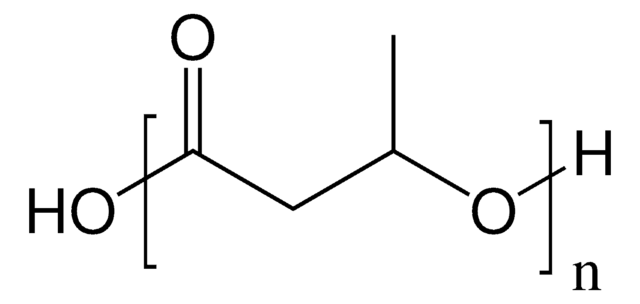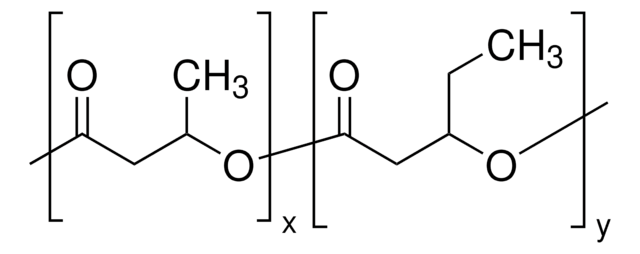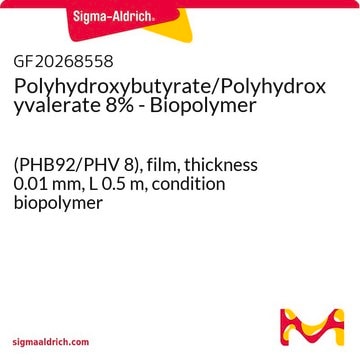363502
Poly[(R)-3-hydroxybutyric acid]
natural origin
Synonyme(s) :
(R)-3-Hydroxybutyric acid polymerized, PHB
Se connecterpour consulter vos tarifs contractuels et ceux de votre entreprise/organisme
About This Item
Formule linéaire :
[COCH2CH(CH3)O]n
Numéro CAS:
Numéro MDL:
Code UNSPSC :
12162002
ID de substance PubChem :
Nomenclature NACRES :
NA.23
Produits recommandés
Niveau de qualité
Température de transition
Tm 172 °C (DSC)
Chaîne SMILES
CC(O)CC(O)=O
InChI
1S/C12H20O6/c1-8(14)6-11(15)18-10(3)7-12(16)17-9(2)4-5-13/h5,8-10,14H,4,6-7H2,1-3H3
Clé InChI
QLACRIKFZRFWRU-UHFFFAOYSA-N
Vous recherchez des produits similaires ? Visite Guide de comparaison des produits
Catégories apparentées
Description générale
Biocompatible, biodegradable polymer.
Application
Poly[(R)-3-hydroxybutyric acid (PHB) is a biodegradable and biocompatible polymer produced by several bacterial species, owing to its low resorbability and tunable properties, it may find uses in a variety of applications such as tissue engineering, controlled release systems etc.
Code de la classe de stockage
11 - Combustible Solids
Classe de danger pour l'eau (WGK)
WGK 3
Point d'éclair (°F)
Not applicable
Point d'éclair (°C)
Not applicable
Faites votre choix parmi les versions les plus récentes :
Déjà en possession de ce produit ?
Retrouvez la documentation relative aux produits que vous avez récemment achetés dans la Bibliothèque de documents.
Molecular mass of poly [(R)-3-hydroxybutyric acid] produced in a recombinant Escherichia coli.
Kusaka S, et al.
Applied Microbiology and Biotechnology, 47(2), 140-143 (1997)
Engineering of Saccharomyces cerevisiae for the production of poly-3-d-hydroxybutyrate from xylose.
Sandstrom A G, et al.
AMB Express, 5(1), 14-14 (2015)
Proliferation and skeletal myotube formation capability of C2C12 and H9c2 cells on isotropic and anisotropic electrospun nanofibrous PHB scaffolds.
Ricotti L, et al.
Biomedical Materials (Bristol, England), 7(3), 035010-035010 (2012)
Rui-Yan Wang et al.
PloS one, 8(3), e57943-e57943 (2013-03-14)
A couple of DNA ligation-independent cloning (LIC) methods have been reported to meet various requirements in metabolic engineering and synthetic biology. The principle of LIC is the assembly of multiple overlapping DNA fragments by single-stranded (ss) DNA overlaps annealing. Here
Daniel Pfeiffer et al.
Journal of bacteriology, 194(21), 5909-5921 (2012-08-28)
Poly(3-hydroxybutyrate) (PHB) granules are covered by a surface layer consisting of mainly phasins and other PHB granule-associated proteins (PGAPs). Phasins are small amphiphilic proteins that determine the number and size of accumulated PHB granules. Five phasin proteins (PhaP1 to PhaP5)
Notre équipe de scientifiques dispose d'une expérience dans tous les secteurs de la recherche, notamment en sciences de la vie, science des matériaux, synthèse chimique, chromatographie, analyse et dans de nombreux autres domaines..
Contacter notre Service technique








